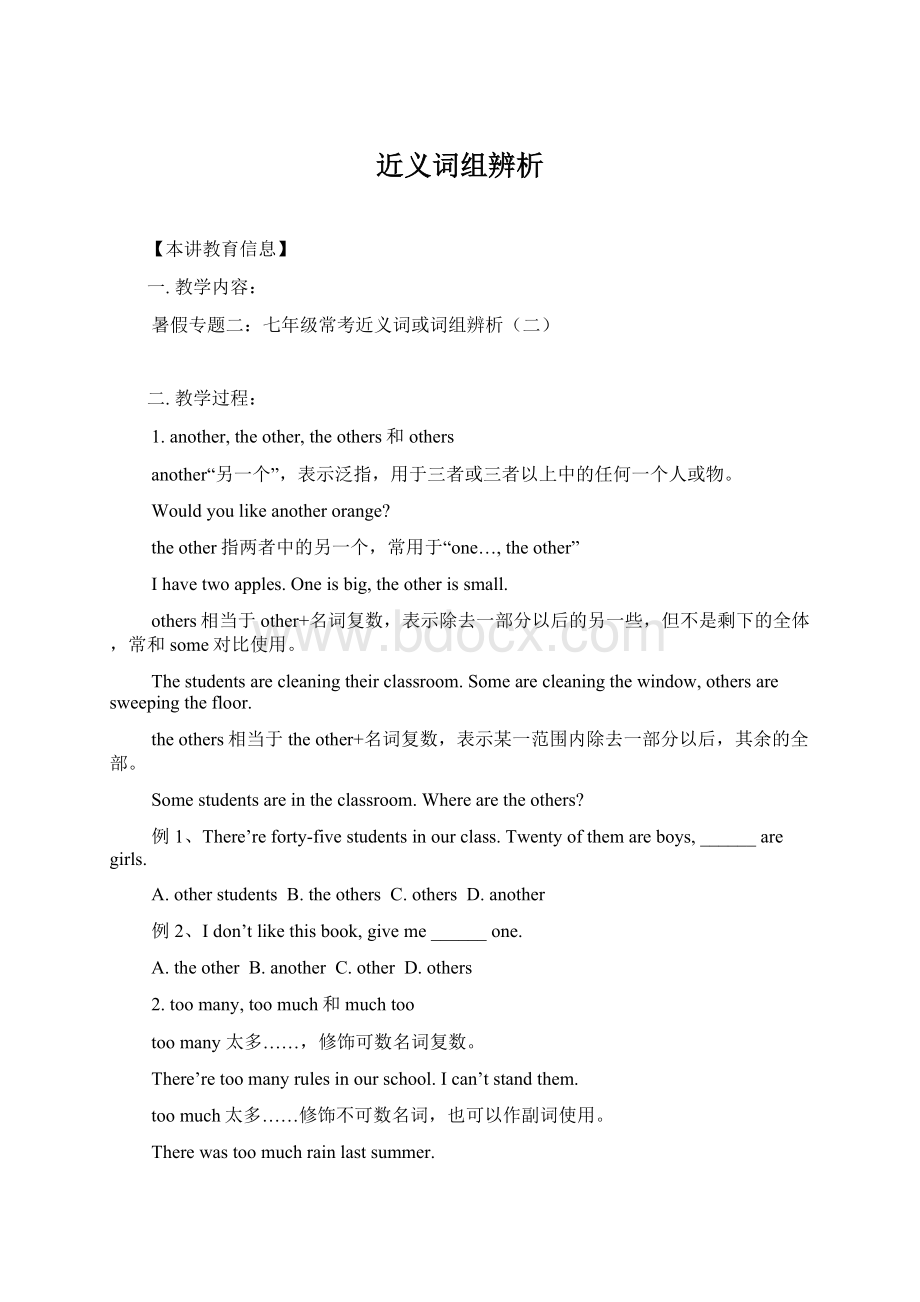近义词组辨析.docx
《近义词组辨析.docx》由会员分享,可在线阅读,更多相关《近义词组辨析.docx(14页珍藏版)》请在冰豆网上搜索。

近义词组辨析
【本讲教育信息】
一.教学内容:
暑假专题二:
七年级常考近义词或词组辨析
(二)
二.教学过程:
1.another,theother,theothers和others
another“另一个”,表示泛指,用于三者或三者以上中的任何一个人或物。
Wouldyoulikeanotherorange?
theother指两者中的另一个,常用于“one…,theother”
Ihavetwoapples.Oneisbig,theotherissmall.
others相当于other+名词复数,表示除去一部分以后的另一些,但不是剩下的全体,常和some对比使用。
Thestudentsarecleaningtheirclassroom.Somearecleaningthewindow,othersaresweepingthefloor.
theothers相当于theother+名词复数,表示某一范围内除去一部分以后,其余的全部。
Somestudentsareintheclassroom.Wherearetheothers?
例1、There’reforty-fivestudentsinourclass.Twentyofthemareboys,______aregirls.
A.otherstudentsB.theothersC.othersD.another
例2、Idon’tlikethisbook,giveme______one.
A.theotherB.anotherC.otherD.others
2.toomany,toomuch和muchtoo
toomany太多……,修饰可数名词复数。
There’retoomanyrulesinourschool.Ican’tstandthem.
toomuch太多……修饰不可数名词,也可以作副词使用。
Therewastoomuchrainlastsummer.
Healwaysspeakstoomuch.
muchtoo“太,非常”用作副词词组修饰形容词和副词,但不修饰动词。
Myteacherismuchtookindtous.
例3、Ihave______homeworktodotoday.Ican’tgowithyou.
A.toomanyB.toomuchC.muchtooD.verymuch
例4、Thesupermarketistoocrowded.______peopleareshopping.
A.ToomanyB.ToomuchC.MuchtooD.Verymuch
3.alittle,little,afew和few
alittle修饰不可数名词,“一点儿”,表肯定含义。
little修饰不可数名词,“几乎没有”,表否定含义。
Ihavelittlewater,canyougivemesome?
afew修饰可数名词,“几个,一些”,表肯定含义。
few修饰可数名词,“没有几个”,表否定含义。
Heisamanoffewwords.
例5、Heisnotakind-heartedman.______peoplecangetonwellwithhim.
A.FewB.AlittleC.LittleD.Afew
例6、Therearefew______inthefridge(冰箱).Let’sgoandbuysomecarrotsandcabbages.
A.vegetablesB.fruitC.meatD.eggs
例7、ThisEnglishnewspaperisveryeasyforthestudentsbecausethereare______newwordsinit.
A.littleB.alittleC.fewD.afew
4.it,one和that
it代词,特指,指代上文提到过的事物。
Ihaveamathbook.Ilikeitverymuch.
one可代替上文中提到的可数名词单数,泛指同类事物,不是同一个事物。
Idon’tlikethispen.Pleaseshowmeanotherone.
that:
特指,指代前面提到的那类物。
可指代可数和不可数名词。
TheweatherinTaiyuaniscolderthanthatinWuhan.
例8、Mysonwantsapetrabbit,butIhavenotimetobuy______forhim.
A.itB.thatC.theoneD.one
例9、——Haveyougotaruler?
——Yes,Ihave______.Ibought______yesterday.
A.one,itB.it,oneC.it,itD.one,one
例10、——TwoEveningPapers,please!
——Onlyonecopyleft(只剩下一份了).Wouldyouliketohave______,sir?
A.oneB.itC.thisD.that
5.stoptodosth和stopdoingsth
stoptodosth停下来(停止手中的活)去做某事
stopdoingsth停止做某事
例11、It’stimeforclass.Nowstop______themusic.
A.tolistentoB.tolistenC.listeningtoD.listening
例12、Wehaveworkedforthreehours.Nowlet’sstop______arest.
A.hadB.haveC.tohaveD.having
6.forget/remembertodosth和forget/rememberdoingsth.
forget/remembertodosth忘记/记住去做某事(事未做)
Iforgettotellhimthenews.
forget/rememberdoingsth忘记/记住做过某事(事已做)
Sherememberedtellingmethestory.
例13、Don’tforget_______MissZhaotocometomyparty.
A.askingB.toaskC.letD.tolet
例14、I’msorryIforgot_______thefloor.
A.cleanB.cleaningC.tocleanD.cleaned
7.puton和wear
puton穿上(衣服)表动作。
Hereisacoatforyou,you’dbetterputitonnow.
wear穿着,戴着,表状态。
Heoftenwearsasweater,buttodayheiswearingabluejacket.
例15、Manygirlslike_______skirtsinspring.
A.wearingB.puttingonC.putonD.wear
8.howmany和howmuch
howmany“多少”,修饰可数名词
Howmanystudentsarethereinyourclass?
howmuch“多少”,修饰不可数名词
Howmuchmoneydoesitcost?
howmuch“多少钱”用来询问价格
Howmucharethebooks?
例16、Thisislittlewaterinthebottle.(对划线部分提问)
Thisbookisfifteenyuan.(对划线部分提问)
9.sometimes,sometime,sometime和sometimes
sometimes副词“有时,不时”。
Sometimeswegotothecinema.
sometime词组表示“一段时间”“若干时间”
Ihavebeenwaitingforyousometime.
sometime副词表示某个不确切的时间“在某一时间”
IsawhimsometimeinMay.
sometimes词组,表示“几次”
Ihavebeentheresometimes.
例17、Ihaveseenhim_______,butIstilldon’tknowhisname.
A.sometimesB.sometimeC.sometimesD.sometime
10.infrontof和inthefrontof
infrontof在……(外部)的前面
Thereisariverinfrontofthehouse.
inthefrontof在……(内部)的前部
Thereisateacher’sdeskinthefrontoftheroom.
例18、Therearealotoftrees____thebuilding.
A.infrontofB.inthefrontof
C.onfrontofD.onthefrontof
11.too,also,either
too,用于肯定句和疑问句中。
表示“也”,放在句末。
Hecanswim.Icanswim,too.
also多用于肯定句中,位于be动词、情态动词和助动词之后,实义动词之前。
Myfatheralsoworksinahospital.
either,多用于否定句,放在句末。
Janecan’tanswerthequestion.Lilycan’t,either.
例19、Chinesefoodis_______verypopularintheworld.
A.alsoB.tooC.eitherD.and
例20、Shedoesn’tlikemath.Idon’tlike_______.
A.alsoB.tooC.eitherD.and
12.inhospital和inthehospital
inhospital表示“生病住院”
Myfriendisinhospital.Iwanttoseehim.
inthehospital表示“在医院里”强调地点。
Myfriendisinthehospitaltolookafterhismother.
例21、——WhatisMarydoing_______?
——Sheislookingafterhermother.
A.inhospitalB.inthehospitalC.athospitalD.atthehospital
【模拟试题】(答题时间:
60分钟)
一、根据句意及首字母提示补全单词。
1.Gos_______downthisroad,andyoucanfindthehospital.
2.Therearemanybooks,newspapersandm_______inthelibrary.
3.R_______toclosethewindowswhenyouleave.
4.Howd_______thefoodis.
5.Thelionsared_______animalsintheworld.
二、用所给单词适当形式填空。
1.Everyyear,therearealotof_______(visit)toChina.
2.Stop_______(talk).Let’sbeginourclass.
3.Itwasa_______(sun)dayyesterday.
4.Wouldyoulike_______(swim)withme?
5.Myfamily_______(go)tothemovieslastnight.
6.——Whatishelike?
——He’s_______(fun)andoutgoing.
7.Thankyoufor_______(tell)methenews.
8.Aretheyvery_______(friend)toyou?
9.Shewearscolorfulclothesbecauseshewants_______(be)youngandbeautiful.
10._______(notarrive)lateforschool.
三、单项选择
1.Doyoumindhis_______?
A.smokeB.tosmokeC.smokingD.smokes
2.Howmany_______arethereinyourschool?
A.womanteacherB.womanteachers
C.womenteacherD.womenteachers
3.What_______itistoday!
A.aniceweatherB.niceweather
C.niceweathersD.niceaweather
4.Iwaslateforclass_______Ididn’tgetupearly.
A.butB.andC.becauseD.or
5.Mike,_______inbed.
A.notreadB.doesn’tread
C.noreadingD.don’tread
6.Ifound_______inthenextroom.
A.himsingingB.hissingingC.hesingD.hesinging
7.Ihave_______totellhim.
A.somethinginterestingB.interestingsomething
C.anythinginterestingD.interestinganything
8.Theapplesare_______high.Ican’treachthem.
A.toomanyB.toomuchC.manytooD.muchtoo
9.Hehastobeinbed_______teno’clock.
A.byB.forC.onD.in
10.Don’tgoout_______windynights.
A.inB.atC.onD.by
四、改写句子
1.I’mshortandthin(对划线部分提问)
______________you______________?
2.WhatdoyouthinkofCultureBeijing?
(改为同义句)
______________you_______CultureBeijing?
3.Childrenareplayinggamesinthegarden.(对划线部分提问)
______________thechildren_______inthegarden?
4.Couldyoupleasenotclosethewindow?
(改为祈使句)
______________thewindow,please.
5.Lucyhastolookafterherbrotherafterschool.(对划线部分提问)
______________Lucy_______to_______afterschool?
【本讲教育信息】
一.教学内容:
暑假专题一:
七年级常考近义词或词组辨析
(一)
二.教学过程:
1.say,speak,tell和talk
say,“讲,说”强调说话的内容,常用作及物动词,宾语可以是代词或从句,也可用于直接或间接引语。
Shesaid,“Idon’tknow.”
speak“讲话,演讲”强调动作,用作及物动词,宾语为表语言的名词,用作不及物动词时常用短语:
speakto/with和……讲话speakof/aboutsth/sb.谈及某事/某人
IcanspeaksomeJapanesenow.
talk“谈话”多用作不及物动词,可与to,with和about连用
Sheistalkingtoherfriends.
tell“告诉,讲述”用作及物动词,后面跟双宾语,宾语补足语,从句或动词不定式
Canyoutellmeyourname?
Tellhimnottobelateagain.
例1、Whatwouldyouliketo_______usaboutyourhometown?
A.speakB.talkC.sayD.tell
例2、It’shardto_______whowillwinthegameintheend.
A.speakB.tellC.sayD.talk
2.look,see,watch和read
look有意识的看,不及物动词,强调看的动作,lookat…
Whatareyoulookingat?
see用作及物动词,强调看的结果。
WhenIgothome,Isawhimcrying.
watch“观看,注意看”指为欣赏或某一特定的目的而注意观看,侧重过程。
watchTV/thematch
IwatchedthebasketballgameonTV.
read“看,读”更强调读的意义。
Ilikereadingstorybooks.
例3、Ihavemanyinterestingbooksto_______.
A.seeB.lookatC.watchD.read
例4、——TheremustbesomethingwrongwiththeTV.
——I’mafraidyouareright.Ithinkwecan_______itinUncleWang’sroom.
A.seeB.lookatC.readD.watch
3.bring,take,get和carry
bring指从别处把某人或某物带来或拿来。
Youmuchbringyourhomeworkhere.
take指从这里把某人或某物带走。
Canyoutakethesebookstotheclassroom?
get“弄来,取来”去某处把某物取来。
Canyougetsomewaterforme?
carry“搬运,提,运送”等等,常表示用人力或交通工具“把……带到……”,无方向性。
Healwayscarriesasmallboxinhishand.
例5、Trucks_______allkindsofthingshereandthere.
A.carryB.takeC.bringD.get
例6、Please_______himtothenursethere,andshe’llgivehimsomepills(药片).
A.carryB.bringC.getD.take
4.lookfor,find和findout
lookfor强调“寻找”的动作。
I’mlookingformypen,butIcan’tfindit.
find指偶然发现,也指经过一番努力后才“找到”,强调结果。
Shefoundasmallboystandinginthecorner.
findout指经过探询,询查之后才发现某人或某事,意为“弄清楚,查明”。
Putyourhandupwhenyoufindouttheanswer.
例7、——Didyou_______yourticket,sir?
——No,I’mstill_______it.
A.find,findingB.lookfor,lookingfor
C.find,lookingforD.lookfor,finding
例8、Thewindowisbroken(破了).Tryto_______whobrokeit.
A.findoutB.findC.lookD.lookfor
5.listen和hear
listen强调有意识或注意地听,表听的动作,不及物动词常用listento搭配。
hear侧重听的结果,是及物动词,h